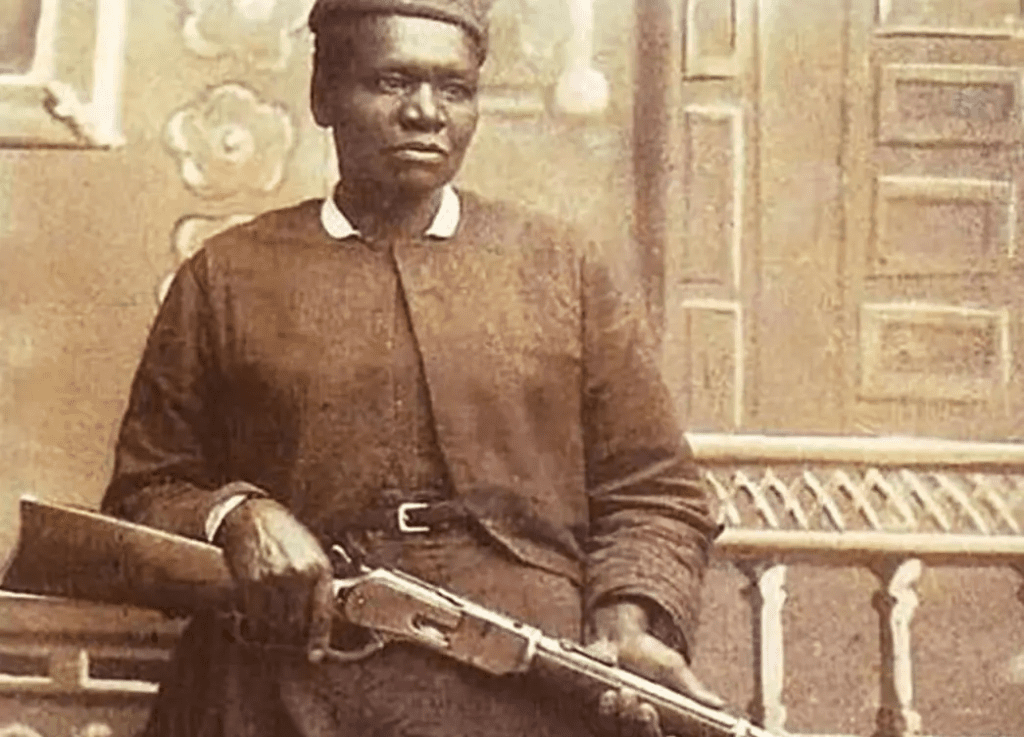They said Mary Fields had “the temperament of a grizzly bear” and a quick hand on the draw, but it was her heart, not her gun, that made her a legend across the Wild West.
Aloft on a stagecoach pulled by six horses, Stagecoach Mary Fields covered more than 300 miles every week, delivering mail across the rugged plains of Montana at the turn of the 20th century.
Standing six feet tall, armed with a revolver and a rifle, cigar in hand, she was the first Black woman, and only the second woman ever, to work for the U.S. Postal Service as a star route mail carrier.
Yet beneath her grit and gun smoke lay something greater: an unshakable loyalty to her community.

From Slavery to Freedom
Born into slavery in 1832 in Hickman County, Tennessee, Mary Fields’ early life remains mostly unknown. Her mother was said to have been a house slave, her father a field slave. Like many enslaved people, her history begins only after emancipation, when she finally gained her freedom in her 30s after the Civil War.
Seeking a new life, Mary worked first as a maid aboard the steamboat Robert E. Lee, then as a servant in the home of Judge Edmund Dunne in Ohio. There, she met Mother Amadeus Dunne, the Mother Superior of the Ursuline Convent in Toledo, a friendship that would shape the rest of her life.

Hired as a groundskeeper at the convent, Mary’s fiery spirit quickly made her famous, and infamous. When one nun asked about her journey to Toledo, Mary reportedly replied she needed “a good cigar and a drink”. Another complained that “God help anyone who walked on the lawn after Mary had cut it.”
Heading West
In 1885, Mother Amadeus fell ill while running a new convent and boarding school in Montana Territory. She sent word for Mary, who traveled west to nurse her friend back to health. After Amadeus recovered, Mary stayed on, hauling supplies, managing the convent’s wagon team, and escorting visitors across treacherous terrain.

Once, when wolves spooked her horses and overturned the wagon, Mary guarded the supplies through the freezing night, single-handedly fending off the pack.
But her strong will often clashed with authority. After a heated argument with a janitor that ended with both drawing their guns, the Bishop of Montana demanded her removal.
Still, Mary had an ally. Mother Amadeus helped her resettle in the nearby town of Cascade, Montana, where she opened a small restaurant, though she was known to feed the hungry whether they could pay or not. The business soon failed, but in 1895, she found her true calling.

Becoming Stagecoach Mary
At over sixty years old, Mary applied to become a mail carrier. Competing against younger men, she hitched a six-horse team faster than anyone, and won the job.
She rode her route daily, covering 17 miles each way between Cascade and St. Peter’s Mission, often extending to 40-mile stretches through snow, wind, and rain. When winter storms made the roads impassable, Mary slung the mail sack over her shoulder and walked more than 30 miles in snowshoes to deliver it.
Locals admired her toughness, but loved her kindness more. She never missed a delivery, never turned down a neighbor in need, and often shared what little she had.
The Legend Grows
By her 60s and 70s, Stagecoach Mary had become a frontier icon.
Weighing 200 pounds and towering over most men, she famously declared she could knock out any man with a single punch, and never lost a bet.
The mayor of Cascade even passed a special law allowing her to drink in the saloon, making her the only woman in town permitted to do so who wasn’t a prostitute.

On her 81st birthday, the Anaconda Standard newspaper wrote:
“Mary’s friends claimed if a fly landed on her horse’s ear, she could either shoot it off or pick it off with her whip end… and if she was in a mind to, she could break the fly’s hind leg with her whip and then shoot its eye out with a revolver.”
After eight years on the postal route, she retired and opened a laundry service. When one customer refused to pay his two-dollar bill, Mary calmly left the saloon, punched him out, and returned saying, “His laundry bill is paid.”
A Beloved Fixture of Cascade
Despite her rough edges, Mary Fields was deeply loved. Locals trusted her with their children, and the Cascade Hotel owner insisted she eat there for free for the rest of her life.
When her home and business burned down, the entire town came together to rebuild her house. She made bouquets for the local baseball team and cheered louder than anyone at their games.

When she died on December 5, 1914, her funeral was one of the largest Cascade had ever seen.
Among the mourners was a boy who would later become a Hollywood legend, Gary Cooper, who met her as a child and never forgot her spirit. He later wrote:
“Born a slave somewhere in Tennessee, some say in 1832, Mary lived to become one of the freest souls to ever draw a breath or a .38.”
